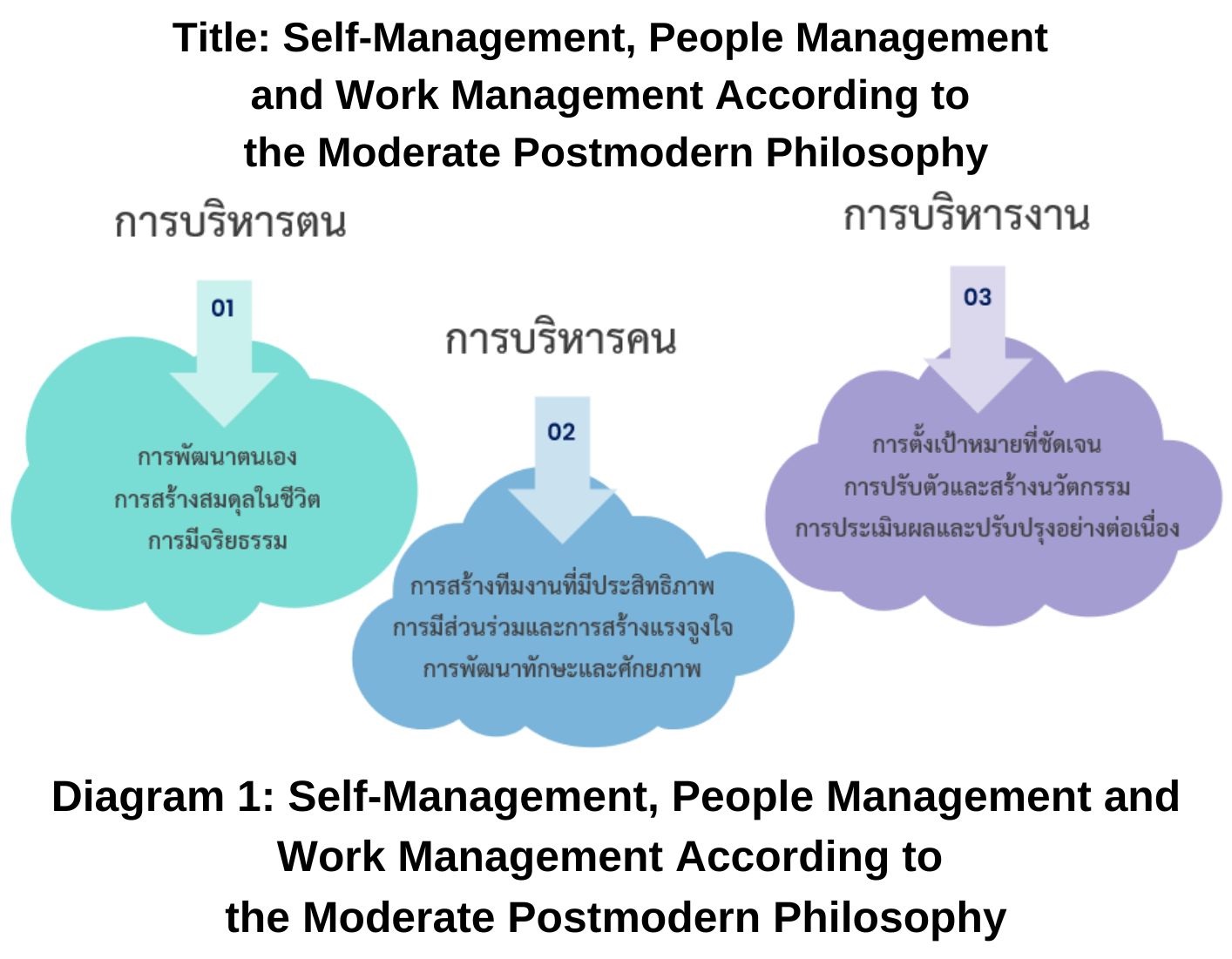Self-Management, People Management, and Work Management According to the Moderate Postmodern Philosophy
Keywords:
Self-Management, People Management, Work Management, Moderate Postmodern PhilosophyAbstract
This research article is a qualitative study that analyzes documents with the aim of examining self-management, people management, and work management according to the principles of moderate postmodern philosophy. The research findings reveal that: 1) Self-management according to moderate postmodern philosophy emphasizes self-awareness, continuous self-development, and adapting to change with mindfulness, without attachment to extreme thoughts. This approach enables individuals to be flexible in dealing with various situations. 2) People management focuses on fostering good relationships within organizations through open communication and supporting collaboration among personnel. The differences in perspectives and skills of each individual are viewed as resources that can be utilized effectively to promote unity and understanding within the team. 3) Work management under this philosophy aims to achieve a balance between careful planning and flexible decision-making. The use of reason and deep consideration allows for adjustments in plans to suit the ever-changing environment, resulting in organizational stability and sustainability. The new knowledge regarding self-management, people management, and work management according to the principles of moderate postmodern philosophy can be categorized into three areas: 1) Self-management includes self-development, maintaining life balance, and ethical behavior. 2) People management involves building effective teams, encouraging participation and motivation, and developing skills and potential. 3) Work management encompasses setting clear goals, adapting and innovating, and continuous evaluation and improvement.
References
เจตนิพัทธ์ พิธิยานุวัฒน์ และคณะ. (2564). อุเบกขากับปรัชญาหลังนวยุคสายกลาง. วารสารสันติศึกษาปริทรรศน์ มจร, 9(5), 2051-2063.
ชิสา กันยาวิริยะ และ สิรินทร์ กันยาวิริยะ. (2567). ผู้นําคุณธรรมตามหลักปรัชญาหลังนวยุคสายกลาง. วารสารสถาบันพอดี, 1(6), 9-18.
พระมหาอนันต์ อนุตฺตโร (อันวิเศษ) และคณะ. (2565). หลังโครงสร้างนิยมกับอรรถปริวรรต. วารสารปรัชญาปริทรรศน์, 27(2), 257-271.
เมธา หริมเทพาธิป. (2559). การมีส่วนร่วมในมุมมองหลังนวยุค. รายงานวิจัย. บัณฑิตวิทยาลัย : มหาวิทยาลัยราชภัฏสวนสุนันทา.
_________. (2561). การมีส่วนร่วมในมุมมองหลังนวยุค. รมยสาร, 16(3), 63-77.
_________. (2563). การจูงใจตนเองในแนวทางหลังนวยุค. วารสารพุทธมัคค์, 5(1), 99-107.
วิลาวรรณ รพีพิศาล. (2554). ความรู้พื้นฐานในการบริหารทรัพยากรมนุษย์ในการบริหารทรัพยากรมนุษย์. กรุงเทพฯ : โรงพิมพ์ วิจิตรหัตถกร.
ศุภกานต์ มินเหล้า. (2553). แนวทางการบริหารจัดการที่มีประสิทธิภาพขององค์กรปกครองท้องถิ่น : ศึกษาเฉพาะกรณี ตําบลสันกลาง อําเภอสันกําแพง จังหวัดเชียงใหม่. สารนิพนธ์ศาสนศาสตร มหาบัณฑิต. บัณฑิตวิทยาลัย : มหาวิทยาลัยมหามกุฏราชวิทยาลัย.
สาคร สุขศรีวงศ์. (2559). MANAGEMENT : from the Executive’s Viewpoint การจัดการ : จากมุมมองนักบริหาร. พิมพ์ครั้งที่ 14. กรุงเทพฯ : บริษัท จี.พี. ไซเบอร์พรินท์ จำกัด.
สิรินทร์ กันยาวิริยะ และ ชิสา กันยาวิริยะ. (2567). การบริหารแบบมีส่วนร่วมตามหลักปรัชญาหลังนวยุคสายกลาง. วารสารสถาบันพอดี, 1(7), 27-40.
สุดธิณีย์ ทองจันทร์, เมธา หริมเทพาธิปและ กีรติ บุญเจือ. (2563). การพัฒนาคุณภาพชีวิตผู้ป่วยด้วยหลักปรัชญาหลังนวยุคสายกลาง. วารสารการวิจัยการบริหารการพัฒนา, 10(1), 31-41.
สุนิสา โมสิโก. (2567). การบริหารตน บริหารคน บริหารงาน ตามแนวพุทธปรัชญาเถรวาท. วารสาร มจร บาฬีศึกษาพุทธโฆสปริทรรศน์, 10(1), 173-188.
อนันต์ชัย คงจันทร์. (2557). Human Resource Management : การจัดการทรัพยากรมนุษย์.กรุงเทพฯ : หจก. เม็ดทรายพริ้นติ้ง.

Downloads
Published
How to Cite
Issue
Section
License
Copyright (c) 2024 Institute of Sufficiency Journal

This work is licensed under a Creative Commons Attribution-NonCommercial-NoDerivatives 4.0 International License.



